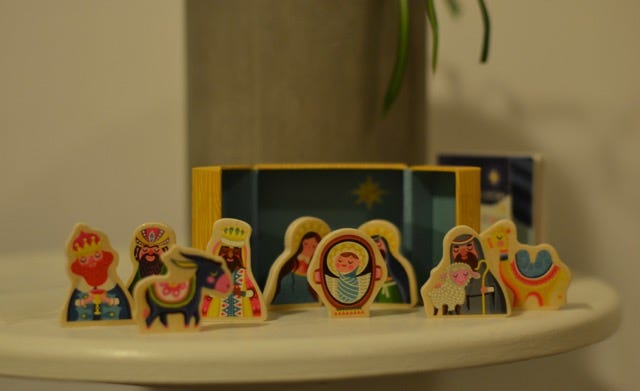Where the love really is at Christmas

I bought this little wooden nativity scene this year. One day I am going to make one, but till then.
So, it was my last day of work for 2016 yesterday. I feel quite chuffed with myself that in the last few weeks I gave myself a hasty crash course in Adobe InDesign (there was a lot of googling!) and made a newspaper. I received the Christmas Message from the Bishop on Wednesday, squeezed it in, took a deep breath and printed a gazillion, then yesterday put mountains of them in the mail, so I can now take rest in peace. Once again I am flying off by myself over Christmas to do another tour of the relatives and maybe a couple of old friends, as the weird and unloved spinster. I don’t particularly enjoy doing this (though I am keen to see my grandparents in particular), and answering all the questions (can you tell?), but I accept that this is the life God has given me to live. And I know that, for all the talk about “family” and “loved ones” at Christmas, that’s not what it’s for. And I know that ultimately I am not unloved (and that someone did indeed take the initiative). As dear old Christina Rossetti wrote, love came down at Christmas. Here’s that poem in full: Love came down at Christmas, Love all lovely, Love Divine, Love was born at Christmas, Star and Angels gave the sign. Worship we the Godhead, Love Incarnate, Love Divine, Worship we our Jesus, But wherewith for sacred sign? Love shall be our token, Love be yours and love be mine, Love to God and all men, Love for plea and gift and sign. And I think this quote from Marilynne Robinson deserves a repost. Even when love seems at its most elusive here on earth, God loves us with this wondrous love. I don’t object to the ‘love narrative’. God didn’t send his Son down here simply to make a penal substitutionary atonement. That would have been completely unnecessary if he didn’t love us enough to consider that worth doing. Higher than the point that God is angry with our sin and too Holy to suffer it, such that he had to send his Son to the cross to reconcile us, is the fact that he cared enough to do it, rather than atomise us in an instant. But here is Marilynne Robinson on the point:
There is a great old American hymn that sounds like astonishment itself, and I mention it here because even its title speaks more powerfully of the meaning of our narrative than whole shelves of books. It is called “Wondrous Love”. “What wondrous love is this that caused the Lord of bliss / to bear the dreadful cross for my soul?” If we have entertained the questions we moderns must pose to ourselves about the plausability of the incarnation, if we have sometimes paused to consider the other ancient stories of miraculous birth, this is no great matter. But if we let these things distract us, we have lost the main point of the narrative, which is that God is of a kind to love the world extravagantly, wondrously, and the world is of a kind to be worth, which is not to say worthy of, this pained and rapturous love. This is the essence of the story that forever eludes telling. It lives in the world not as myth or history but as a saturating light...
~ When I Was A Child I Read Books, by Marilynne Robinson I don’t leave till Tuesday, and the urge to post something might strike again before then, but if not I hope anyone still out there reading here has a joyful Christmas and a peaceful New Year.

